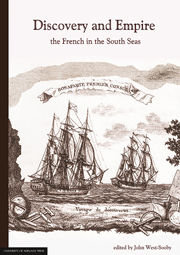Book contents
- Frontmatter
- Contents
- List of Figures
- List of Contributors
- Acknowledgements
- Introduction
- Note on the Second Frank Horner Lecture
- 1 The Globe Encompassed: France and Pacific Convergences in the Age of the Enlightenment
- 2 The Abbé Paulmier's Mémoires and Early French Voyages in Search of Terra Australis
- 3 The Acquisitive Eye? French Observations in the Pacific from Bougainville to Baudin
- 4 Discovering the Savage Senses: French and British Explorers' Encounters with Aboriginal People
- 5 A Case of Peripheral Vision: Early Spanish and French Perceptions of the British Colony at Port Jackson
- 6 New Creatures Made Known: Some Animal Histories of the Baudin Expedition
- 7 “Primitive race”, “pure race”, “brown race”, “every race”: Louis Freycinet's Understanding of Human Difference in Oceania
- 8 Imperial Eyes on the Pacific Prize: French Visions of a Perfect Penal Colony in the South Seas
4 - Discovering the Savage Senses: French and British Explorers' Encounters with Aboriginal People
Published online by Cambridge University Press: 05 April 2014
- Frontmatter
- Contents
- List of Figures
- List of Contributors
- Acknowledgements
- Introduction
- Note on the Second Frank Horner Lecture
- 1 The Globe Encompassed: France and Pacific Convergences in the Age of the Enlightenment
- 2 The Abbé Paulmier's Mémoires and Early French Voyages in Search of Terra Australis
- 3 The Acquisitive Eye? French Observations in the Pacific from Bougainville to Baudin
- 4 Discovering the Savage Senses: French and British Explorers' Encounters with Aboriginal People
- 5 A Case of Peripheral Vision: Early Spanish and French Perceptions of the British Colony at Port Jackson
- 6 New Creatures Made Known: Some Animal Histories of the Baudin Expedition
- 7 “Primitive race”, “pure race”, “brown race”, “every race”: Louis Freycinet's Understanding of Human Difference in Oceania
- 8 Imperial Eyes on the Pacific Prize: French Visions of a Perfect Penal Colony in the South Seas
Summary
Joseph-Marie Degérando, who penned the ethnographic instructions that were adopted for the Baudin expedition's voyage to the South Seas, advised French naturalists and scientific travellers to investigate the “senses of the Savage”. He urged them to ascertain which senses native peoples most frequently called upon and what circumstances influenced their development. These instructions also requested explorers to compare indigenous people's faculties of sense to those of the Europeans, and to determine to “what class and species of sensation do they attach most pleasure?” Degérando even proposed a methodology, which Baudin and his men were rarely if ever in the position to carry out. He suggested that the ethnographer should judge each particular sense against the following criteria:
the art with which two or more sensations are distinguished;
the tenuity of sensations that can be noticed; 3. the number of sensations that can be simultaneously grasped; 4. the speed with which the operations are carried out; 5. the capacity to prolong them for a more or less long period without fatigue; 6. finally, the precision of the judgements which sometimes accompany them.
Degérando's naive disregard of the practical circumstances in which explorers would commonly find themselves was patent, for they rarely had the opportunity to follow his carefully constructed methods of observation. However, his instructions reveal the broader significance placed on investigating the human senses in the eighteenth century.
- Type
- Chapter
- Information
- Discovery and EmpireThe French in the South Seas, pp. 99 - 140Publisher: The University of Adelaide PressPrint publication year: 2013



